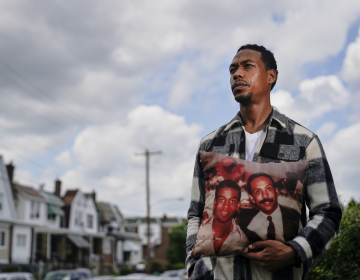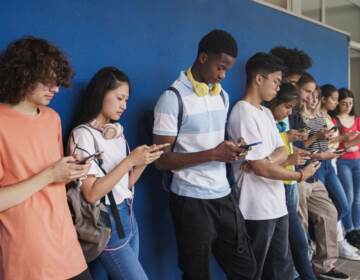COVID and gun violence forces the Uplift Center for Grieving Children to pivot in new ways to help
The nonprofit provides grief counseling through peer and crisis support for children and teens grades K-12 who have experienced the death of someone significant in their lives
Listen 6:00
Darcy Walker Krause is executive director of Uplift Center for Grieving Children. (Courtesy of Uplift Center)
There’s been an increase in mental health emergencies and a decline in mental health wellbeing among teenagers since the start of the pandemic, according to the Centers for Disease Control and Prevention. This week, The New York Times reported that the mental health crisis among teens has become “life or death,” as depression, suicidal ideation, and self-harm rise among adolescents.
In Philadelphia, the issue is particularly acute. The city has experienced record homicide numbers and gun violence incidents and thousands have lost their lives to COVID and to the opioid crisis.
“Sometimes parents and caregivers think the kids aren’t grieving, or they may grieve a little and they’ll be okay,” says Darcy Walker Krause, “Kids are resilient, but that resilience has to be fostered.”
Darcy Walker Krause is executive director of the Uplift Center for Grieving Children. The non-profit provides grief counseling through peer and crisis support for children and teens grade K-12 who have experienced the death of someone significant in their lives. With so many deaths in our region and loss brought on by the pandemic, the number of children impacted grew.
“Kids couldn’t access the adults that they needed to have access to, particularly when the schools were closed,” says Walker Krause, “and whatever you’re dealing with whether it’s a death or loss or an ambiguous loss like schools closing, that’s a loss of something that you expect to be normal and it’s not .”
She says during the COVID-19 shutdown, Uplift was forced to pivot. They took their peer support and grief counseling online, offering virtual support groups. In addition, in partnership with the School District of Philadelphia, the non-profit launched the Philly HopeLine, providing young people with access to trained clinicians more than 40 hours per week. The professionals provided counseling, connected youth to peer support groups, and made referrals.
“In the early days of the pandemic, we were getting people connected to schools, but now people are calling for a variety of mental health needs,” says Walker Krause.
According to Uplift records, the group has fielded 780 calls on the HopeLine since its inception in 2020 and while there was a drop off in 2021, calls have increased since December.
“Every time there’s death or a shooting- there is a child or children that are connected to that loss,” says Walker Krause. “We were getting calls once a week, I’d say, from another school who had lost a young person.”
During the pandemic, Walker Krause says Uplift has served over 7,000 kids over the pandemic and has hosted roughly 3,000 training sessions. All factors that the Uplift team is proud of:
“I think that what I’m really proud of with our team is that we were there to respond and we are there to respond,” she says.
On May 5, Uplift Center for Grieving Children will hold its largest fundraiser of the year, “An UPLIFTing Evening” at Vie by Cescaphe.
To contact the Philly HopeLine call 1-833-PHL-HOPE or visit them online.
WHYY is your source for fact-based, in-depth journalism and information. As a nonprofit organization, we rely on financial support from readers like you. Please give today.





